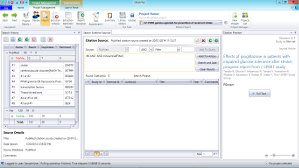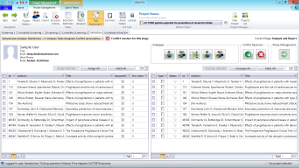Features
SRDB.PRO
SRDB.PRO is a comprehensive enterprise level, client based software tool for managing and aiding systematic review and data analysis processes. It allows teams of analysts to easily cooperate and share results through a service database, either hosted by SRDB.PRO or the company.
Managing the Systematic Review projects
SRDB.PRO streamlines the process by giving the option to automate task assignments, notifications and reduces work needed for the most time-intensive tasks. During the creation of a project the PM has options to:
- Assign users to the project or unassign them if the need arises.
- Delegate project creation tasks to senior or super senior users.
- Set milestones which can be used to estimate the end-date of the project, a gantt graph of all company projects can be viewed on the project details page.
- Toggle an anonymous mode, which hides analyst names on the conflict reconcilement steps to prevent possible bias.
On the Summary page the project manager can view all necessary information:
- The current project status,
- Information, Warning and Error messages related to the project creation steps,
- Statistics and progress of all project stages.
Importing Citations
Publication citations can be imported to the database by four different ways:
- Manual Source - the whole information is input by the user. Examples of citations that can be entered by this method are hand-search or conference abstracts, unpublished reports, sources from company in-house databases.
- External Source - SRDB.PRO can be used to directly import citations from the PubMed library. Possible fields can be selected from the dropdown list to speed up the process, query terms can be combined with AND, OR and NOT, also accessible from a dropdown. Advanced search features like MeSH terms and filters can be used and previous queries can be referenced from the search history by using a hashtag e.g. #1 AND #2.
- Search Locally - All previous company projects can be searched for relevant citations using the same methods used in External Source.
- Import from File - Citation info can be read from CSV, Cochrane and BRS Tagged files and saved to the database. In case of CSV files, escape characters and column labels can be defined before parsing.

Defining the process
The following elements can be set up by the project manager and seniors to define the systematic review process:
- Exclusion and inclusion criteria for the screening steps.
- Customisable data extraction grids with treatments, outcomes and various data columns.
- Population details information fields.
- Study Details and Critical Appraisal questions, which can be open, single or multi-choice. Hints can be input and data types chosen to help the extraction process.
- A report template can be created for the project or chosen from those available to the company.
Task Management
The Task Assignment screen provides an easy way for the project manager to distribute tasks and view the progress throughout the whole systematic review process. This is also where the SR phases are managed and conflict resolvers are set. Task can be assigned manually or by using one of the provided automatic assignment strategies:
- All to all - Each citation will be assigned to all the users with the analyst role.
- Single pass with random assignment - Each citation will be assigned to one analyst. If there is more than one analyst working on the project, the citations are randomly assigned across the analysts, with each analyst given an equal number of citations to review.
- Single pass with considered assignment - Each citation will be assigned to one analyst. If there is more than one analyst working on the project, the software will assign citations to users who have reviewed them on the previous step. This is referred to as considered assignment.
- Double pass with random assignment - Each citation will be assigned to two analysts. If there are more than two analysts working on the project, the citations are randomly assigned across the analysts, with each analyst given an equal number of citations to review.
- Double pass with considered - Each citation will be assigned to two analysts. If there are more than two analysts working on the project, the software will assign citations to users who reviewed them on the previous step. This is referred to as considered assignment.

Aiding the systematic review
SRDB.PRO provides convenient ways to ease the review and analysis processes:
- All progress can be stored in the service database.
- Full text requests can be sent to the British Library directly from the client.
- Automatic task assignment and notifications provide a seamless workflow.
- Automatic removal of duplicates from the citation sources.
- Publications based on the same study can be linked to remove the necessity of going through the same data multiple times.
- Study Ids can be set to distinguish citations without the need to reference them by the regular Id number.
- Citation list filtering.
- Easy to use data extraction forms.
- Assisted conflict resolution.
- Progress statistics.
- Documents can be locked by users to prevent conflicting edits.
Data analysis
SRDB.PRO provides an advanced feature for exporting extracted data into text and spreadsheet documents. All data can be exported from the SRDB.PRO database using filters, grouping, sorting and aggregation functions to provide a fully customisable output.
Report Creation
Reports can be written based on templates selected by the project manager. User can collaborate on the report by using the lock feature that prevents simultaneous edits. The document can be edited in Microsoft Word or in the SRDB.PRO text editor, where database data can be directly exported and progress can be tracked.
An automatically generated systematic review diagram can be inserted into the document.
The finished report can be exported into PDF, RTF, HTML and Word document formats.